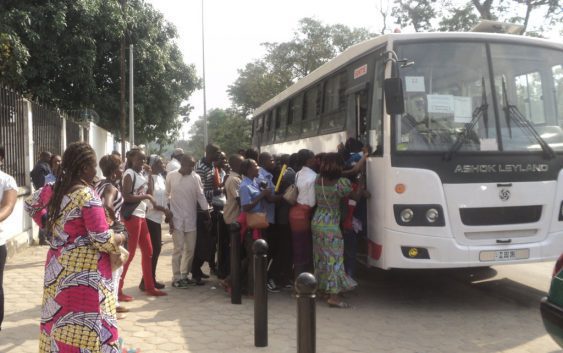Long considered as lazy people or even losers in Brazzaville, the capital of the Republic of Congo, beaters or loaders of bus or public transport vehicles have had the merit of correcting this negative opinion, giving their functions an image that now forces respect.
To do this, they have, under the supervision of the Police, grouped into associations whose members wear yellow or khaki vests. The confidence of carriers and travelers is such that beaters now have girls in their ranks. This is an innovation, because until recently, there were only men of 15 to 35 years of age who struggle in the various bus stations of the Congolese capital to guide travelers.
In fact, girls are part of the decor of bus stations and you can see them, from dusk to dawn, go to the front of travelers or warn them loudly of the imminent departure of a bus or a car. In no way yielding to their male colleagues, girls even guide travelers to the car they have to take.
From 8 am to 10 pm or 11 pm, when public transport cars stop, the beaters carry out their incessant ballets, from the passengers to the vehicles, and once the loading is over, they are seen approaching the driver to receive the “salary” of their service: 100 CFA francs.
It’s the price of a passenger “loading,” Gabriel Tsali explains, insisting that putting together all 100 CFA franc coins collected on each bus can result in a daily income of 15,000 CFA francs to 20,000 CFA francs. “At the end of the month we share these revenues, which constitute our wages. We are ten (beaters) in our association, working in two Brazzaville stations”, he adds. According to him, this holiday period is not so “profitable” compared to the school year when he and his colleagues are really rubbing their hands.
Nevertheless, Gabriel is doing rather well, because he manages to support his family and regularly pay for the rent of the two-room apartment he occupies, representing 35,000 CFA francs a month.
Gabriel, a 25-year man, who left university for “lack of support” dreams of having his driver’s license and finally being a public transport driver. When asked why he wants to leave the shippers” business, he says that this job takes him too much time, in addition to being constantly on his guard so that the drivers or their controllers pay their dues after each load.
Found at the bus station of Gamakosso (north-west of Brazzaville), Jeannette Ongoli enjoys her activity and does not plan to do something else. A small bag slung over her shoulder, she tirelessly crisscrossed the station, picking up passengers and quickly reaching out to the drivers who had finished filling up with passengers and preparing to leave. As soon as the coin of 100 CFA francs is deposited on her palm, she buries it in her bag and goes away to the next vehicle on the departure list.
“I occupy my day, it’s my job. I come here every day, despite the cold and the sun,” says Jeannette Ongoli, between cries addressed to travelers in search of a vehicle.
In her late 20s, Jeannette, who does not like “to be cared for by men or dependent on parents,” tells us that she manages to support herself and her child.
Having been unable to find work despite management studies leading to a diploma, she has, instead of remaining unemployed, set her sights on the shippers’ trade, an activity she considers to be within her “reach.”
Two other girls officiate with Jeannette at the Gamakosso bus station. They take turns with boys, who, by a tacit agreement, remain in office until 23:00 if necessary. The three girls leave earlier around 20:00.
According to Jeannette, sharing revenues with their male colleagues is “no problem,” especially since, she says, everything happens under the supervision of Police officers in charge of the bus station surveillance.
Rightly, law enforcement officials welcome the new image of shippers who, by regulating their activities, they have helped put some order in the chaotic situation that had been prevailing in Brazzaville bus stations.
LCM/cat/fss/abj/APA


